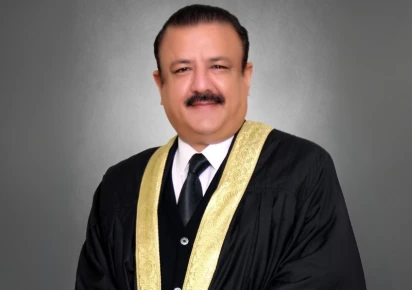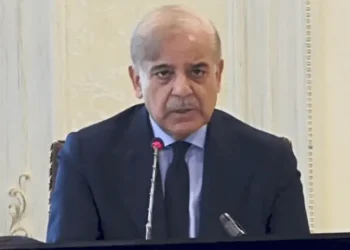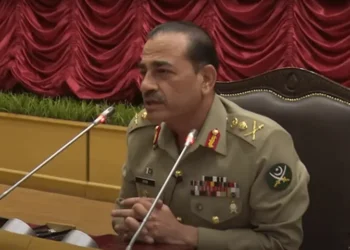By Asif Naveed
ISLAMABAD; The Supreme Court of Pakistan (SC) on Monday suspended the Islamabad High Court’s (IHC) recent order that had barred Justice Tariq Mehmood Jahangiri from performing judicial functions over allegations surrounding his law degree.
According to the SC’s interim order, the “operation of the impugned order is suspended.” Notices were also issued to all respondents, including the Attorney General of Pakistan and the Advocate General of Islamabad, as the matter involves constitutional interpretation. The hearing has been adjourned until tomorrow.
Background of the Case
The controversy dates back to July 2023, when a complaint was filed in the Supreme Judicial Council (SJC) questioning the authenticity of Justice Jahangiri’s law degree. Earlier this year, a petition was also filed in the IHC challenging his appointment.
The issue gained momentum when a letter purportedly from the University of Karachi’s controller of examinations surfaced on social media, raising doubts about the judge’s credentials. On September 16, a two-member IHC bench issued an interim order barring Justice Jahangiri from exercising judicial powers. He later challenged this order in the SC.
SC Proceedings
On Monday, a five-member SC bench led by Justice Aminuddin Khan heard the petition. Other members included Justices Jamal Khan Mandokhail, Muhammad Ali Mazhar, Hassan Azhar Rizvi, and Shahid Bilal Hassan.
Justice Jahangiri himself was present, along with several IHC judges, including Justices Mohsin Akhtar Kiani, Babar Sattar, Sardar Ijaz Ishaq Khan, and Saman Rafat Imtiaz. During the hearing, Islamabad Bar Council member Aleem Abbasi requested to be added as a respondent along with the District Bar Association. However, Justice Mandokhail noted that the main petitioner remained Justice Jahangiri himself.
Justice Aminuddin Khan stated that the SC would follow its standard procedure and number the application accordingly.
Arguments by Jahangiri’s Counsel
Senior lawyer Munir A. Malik, representing Justice Jahangiri, argued that for the first time in judicial history, a two-member bench had restrained a sitting high court judge from performing judicial work. He contended that the order violated established legal principles and denied justice.
Malik pointed out that although a writ petition against Justice Jahangiri was filed on July 10, 2024, objections raised by the registrar’s office remain unresolved. He further highlighted that the judge who issued the restraining order was among those whose transfer to the IHC had been previously contested in the SC.
He stressed that despite 16 months having passed, no hearing had been granted to Justice Jahangiri. Malik also cited a ruling by Justice Mandokhail, which held that only the SJC—not fellow judges—has constitutional authority to probe misconduct allegations against superior court judges.
Justice Hassan Azhar Rizvi questioned how the petition was listed for hearing in the IHC despite registrar objections. He directed both sides’ counsels to prepare detailed arguments on this point.
The hearing was adjourned until tomorrow.
Degree Controversy
The degree dispute originated from a Karachi University letter, allegedly issued under the Sindh Right to Information Act, 2016. It showed conflicting enrolment numbers linked to Tariq Mehmood Jahangiri’s 1991 LLB degree, leading to claims of invalidity rather than outright forgery.
In July 2024, the IHC termed the campaign against Justice Jahangiri as an attempt to scandalize the judiciary and amounting to contempt. However, Karachi University’s syndicate later cancelled his degree on September 1, 2024, following the recommendations of its Unfair Means Committee.
Days later, the Sindh High Court (SHC) suspended KU’s cancellation, ruling that Jahangiri had not been given a chance to defend himself. Still, on September 16, the IHC issued its restraining order, now challenged in the SC.
The matter remains unresolved, with multiple petitions pending before the SC, SHC, IHC, and SJC.





































































